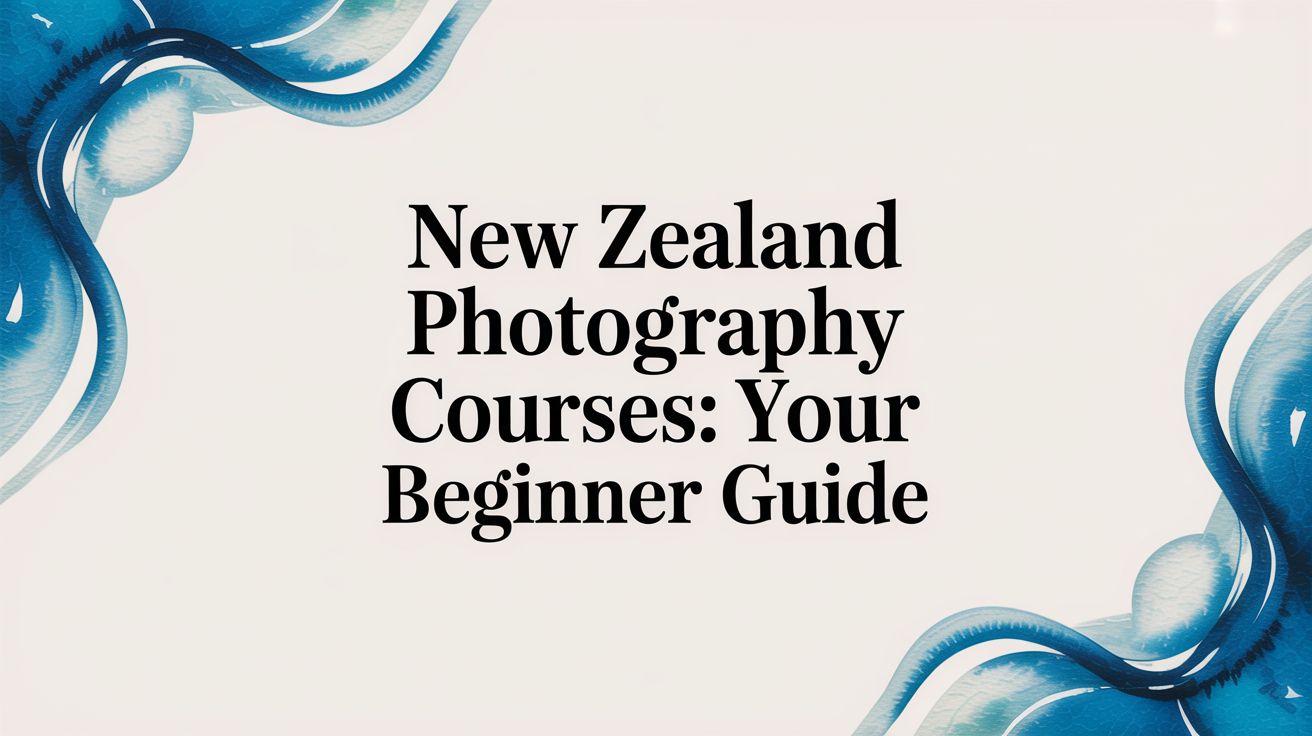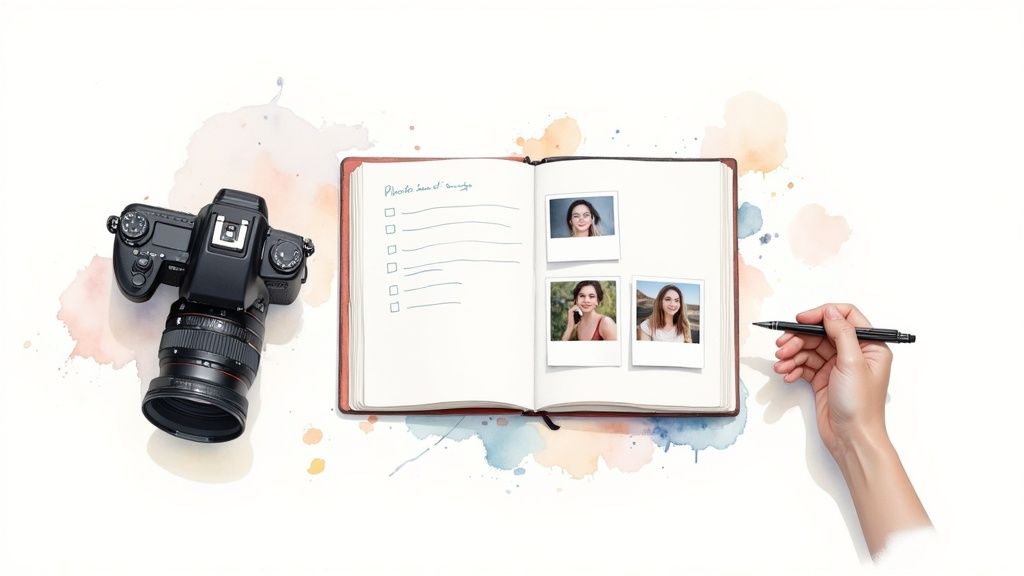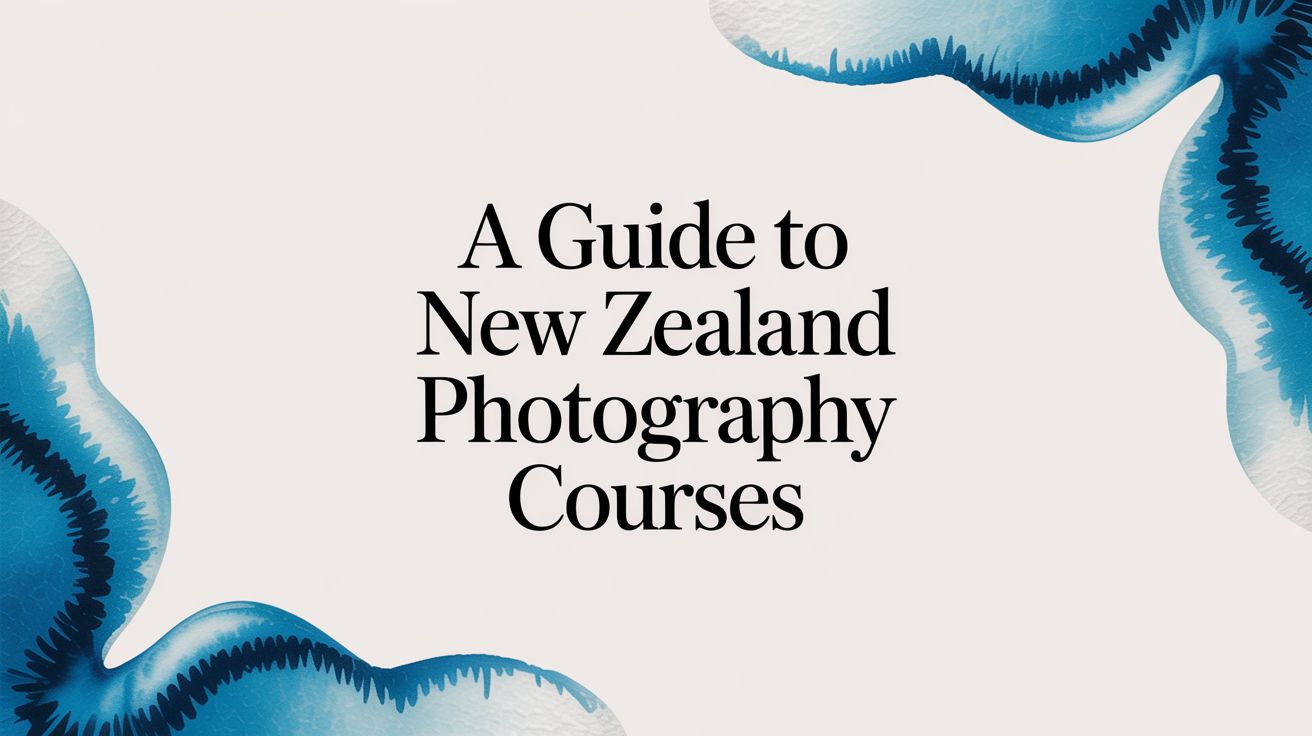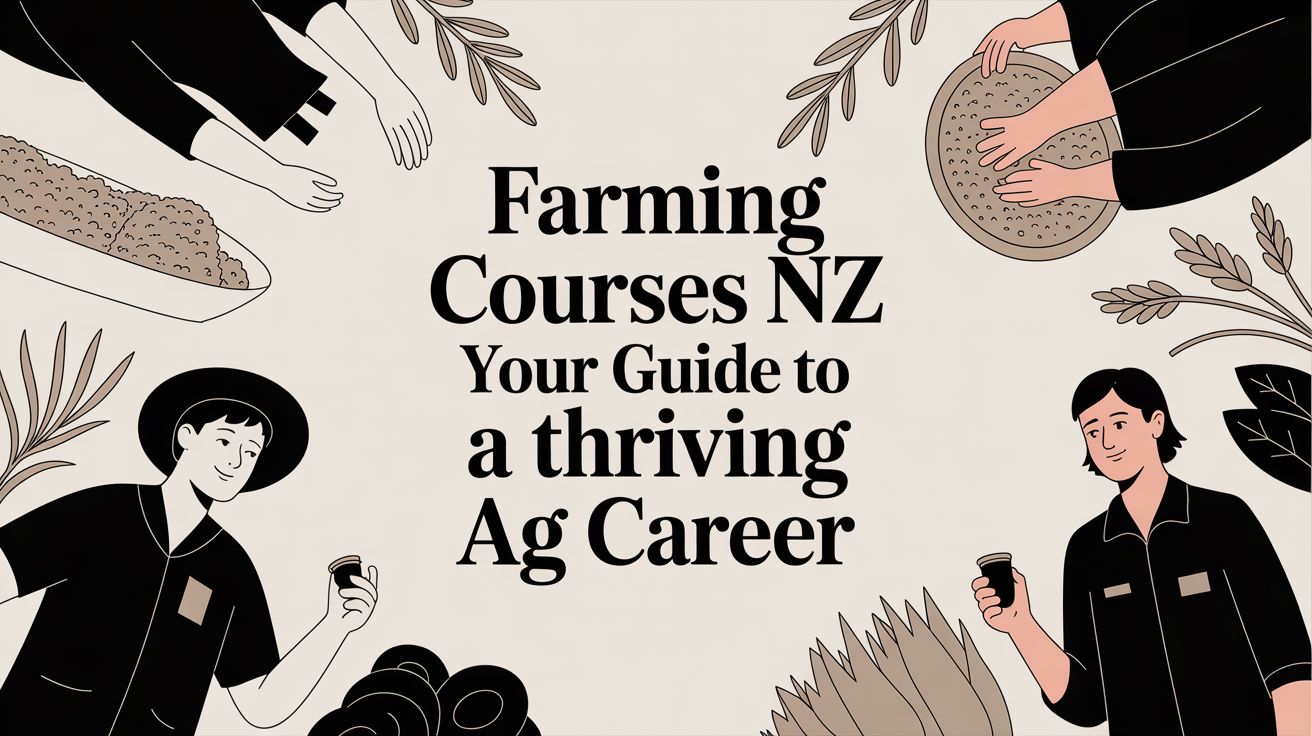
new zealand photography courses: Your Beginner Guide
Finding your perfect photography course in New Zealand can feel like the first step on an incredible creative journey. Whether you dream of capturing Fiordland’s epic landscapes or launching a portrait business, Aotearoa has a huge variety of learning paths, from weekend workshops to complete online programmes designed to fit your goals and lifestyle.
The key is finding a course that teaches you practical, real-world skills to turn your passion into polished, professional-quality images.
Your Guide to Photography Courses in New Zealand
Ready to take your photography from a casual hobby to a serious skill? Choosing the right learning path in New Zealand is the most important decision you'll make, but with options catering to every ambition and schedule, it can be a little overwhelming.
This guide will walk you through everything you need to know. We’ll break down the different types of courses, what to look for in a curriculum, and how to choose between online and in-person formats. Think of this as your roadmap to finding a programme that truly matches your creative vision. And remember, no matter which course you choose, understanding how to learn effectively is fundamental to mastering any new skill.
Understanding Your Options
The world of photography education in New Zealand is incredibly diverse. You can find everything from short, intensive workshops to multi-year university degrees. It’s important to understand the two main streams you'll encounter.
The Two Main Paths
It's helpful to split the options into two broad categories:
- Formal NZQA Qualifications: These are nationally recognised degrees and diplomas offered by registered institutions like universities and polytechnics. Think Bachelor's degrees that take three or four years, or one to two-year diplomas.
- Practical Skills-Based Training: This is a massive category that includes a huge range of excellent courses, workshops, and online programmes. The focus here is squarely on teaching you job-ready skills without leading to a formal NZQA qualification.
Here's a secret from inside the industry: many of the most successful photographers built their careers on practical, skills-focused training. A strong portfolio and real-world expertise often speak louder than a piece of paper. The best choice depends entirely on your personal and professional goals.
Ultimately, your decision should come down to what you want to achieve. Are you aiming for an academic qualification, or do you want to quickly gain the hands-on abilities needed to start a side hustle or simply take much, much better photos?
For those who want to prioritise practical learning and career readiness, there are plenty of skills-focused New Zealand photography courses to explore.
Decoding the Different Types of Photography Courses
Choosing the right way to learn photography is your first big step on this creative journey. Here in New Zealand, the options are massive, with courses designed for every kind of ambition—whether you're just looking to capture better photos on your weekend tramps or you're dead serious about building a professional portfolio.
Getting your head around these different categories is the key to finding a path that actually fits your goals, your lifestyle, and your budget. Let’s break down the main types of photography courses you'll come across in Aotearoa. Think of it as a roadmap to get you from where you are now to where you want to be with your camera.
This decision tree gives you a quick visual on which path might work best, depending on what you’re trying to achieve.

The main takeaway here is pretty clear: your end goal should steer your choice. There's no single "best" path for everyone; it’s all about what gives you the most value for your specific needs.
To help clarify your options, here’s a quick comparison of the main course types you'll find.
Comparing Photography Course Types in New Zealand
This table gives you a bird's-eye view, but let’s dive a bit deeper into what each of these really means for you.
Short-Term Workshops and Masterclasses
Think of workshops as the sprinters of photography education. They’re super-focused, intense sessions that might last anywhere from a single afternoon to a full weekend. The whole point is to teach you one very specific, tangible skill in a short burst.
These are absolutely perfect if you want to:
- Master a specific technique: Like finally learning the secrets to killer astrophotography under the Mackenzie Basin’s dark skies.
- Improve a particular genre: Spend a day with a pro getting the hang of portrait lighting, for example.
- Get hands-on practice: You get immediate feedback from an instructor right there while you’re shooting.
Workshops are brilliant for targeted skill boosts, but they won't give you a complete, A-to-Z education. They’re a fantastic way to add to what you already know or just dip your toes into something new without a massive commitment.
Comprehensive Online Photography Courses
Online courses are more like the marathon runners. They offer a complete, structured curriculum you can tackle at your own pace, which gives you incredible flexibility. This format is a lifesaver for busy people trying to fit study around work, family, or anything else life throws at them.
A great online course lays out a clear learning pathway, guiding you from the ground up—from core concepts like exposure and composition all the way to advanced editing and building a killer portfolio. Unlike a one-off workshop, these programmes build your knowledge block by block, making sure you have a rock-solid foundation.
The real magic of a well-designed online course is how it blends structure with freedom. You get a clear, step-by-step roadmap for improvement without being chained to a rigid class schedule. For anyone who's self-motivated, it's one of the most powerful ways to learn.
The NZQA vs Skills-Focused Divide
When you start looking at longer courses, you’ll quickly run into a big fork in the road here in New Zealand. It’s the difference between formal, government-regulated qualifications and practical, skills-first training.
NZQA-Accredited ProgrammesThese are the formal qualifications—think diplomas and degrees—offered by universities, polytechs, and registered Private Training Establishments (PTEs). They are regulated by the New Zealand Qualifications Authority (NZQA) and are part of the New Zealand Qualifications Framework (NZQF). These academic programmes often take years to complete and are geared towards those on a traditional tertiary education path.
Skills-Focused Training ProvidersOn the other side of the fence, you have many fantastic photography educators who operate outside the NZQA system. We're one of them. Our focus isn't on providing a formal qualification; it's on delivering practical, industry-relevant skills you can put to use straight away.
These courses are built to teach you exactly what you need to know to take incredible photos, build a portfolio, and maybe even kick off a side hustle or a full-blown business. The value is measured in the real-world skills and confidence you walk away with, not in credits on a government framework. For a lot of aspiring photographers, this direct-to-skill approach is a much faster and more cost-effective way to get where they want to go.
What a High-Quality Course Curriculum Includes
A great photography course is more than just a list of topics; it’s a structured journey designed to take you from amateur to artist. The curriculum is the heart of any programme, and knowing what to look for will help you see past clever marketing and choose a course that delivers real, lasting skills. It's about finding a clear path that builds your confidence one step at a time.
This journey starts with balancing two critical areas: technical mastery and creative development. One without the other will leave you with a significant gap in your abilities.

Balancing Technical Skills with Creative Vision
A solid curriculum first makes sure you master the science of photography. This means getting completely comfortable with the fundamentals of your camera and how light works. Without this foundation, your creative ideas will always be limited by what you can technically achieve.
But technical perfection alone doesn't make a compelling photograph. That's why a high-quality course moves beyond the "how" and dives deep into the "why"—the art of seeing, composing, and telling a story with your images.
A well-rounded curriculum should cover:
- The Exposure Triangle: A deep understanding of how aperture, shutter speed, and ISO work together to control light and create mood. This is the absolute bedrock of manual photography.
- Light and Shadow: Learning to see and manipulate light, whether it’s the golden hour glow over the Southern Alps or controlled lighting in a studio.
- Composition and Storytelling: Moving beyond the rule of thirds to understand leading lines, framing, balance, and how to guide the viewer’s eye through your image.
- Post-Processing Workflow: Modern photography doesn't end when you press the shutter. A quality curriculum shows you the ropes on how to edit photos professionally to bring your creative vision to life.
The Power of Practical Application
Theory is important, but photography is a hands-on craft. The best New Zealand photography courses are built around getting you out there and shooting. You can watch videos about aperture all day, but you won't truly get it until you apply it, make mistakes, and learn from them.
This is why you should look for courses that prioritise real-world assignments. These aren't just tests; they are opportunities to apply what you've learned and start building a body of work you can be proud of. Many top providers, for instance, now favour practical assessments over traditional exams to make sure students develop the hands-on skills needed in the creative industry.
The single most important element of any photography course is feedback. A great curriculum includes a clear system for getting your work reviewed by experienced photographers who can offer constructive, personalised advice to help you improve.
Key Questions to Ask Before Enrolling
To find a course that truly grows your skills, you need to ask the right questions. Think of yourself as an investigator trying to understand exactly what you’re investing your time and money in.
Here is a checklist of essential questions to ask any course provider:
- How is progress measured? Are assessments based on practical projects and portfolio development, or are they simple multiple-choice quizzes?
- What level of instructor support is available? Can you ask questions and get timely, detailed answers from a real person?
- Is there a student community? Learning alongside peers provides motivation, support, and a chance to share work and get feedback from others on the same journey.
- What are the practical outcomes? Does the course guide you in creating a professional portfolio you can use to attract clients or showcase your work?
A course that provides clear, confident answers to these questions is one that values student success. For those ready to dive deep into both the technical and creative sides of the craft, exploring a programme like our Advanced Photography Course Bundle can provide the structured, hands-on learning you need to build a strong portfolio from scratch.
Choosing Your Learning Style: Online vs In-Person
How you learn is just as crucial as what you learn. When you're looking at the huge range of New Zealand photography courses out there, one of the first big decisions you'll face is about your learning style. Should you stick with a traditional in-person class, or is the flexibility of an online programme a better fit?
Each path has its own distinct advantages. The right choice really comes down to your lifestyle, how you prefer to soak up information, and what you’re hoping to achieve with your photography. Let's break down the practical differences to help you find your perfect match—this isn't about which is "better," but which is better for you.
The Case for In-Person Workshops
There's something special about in-person courses and workshops, especially for a hands-on, technical craft like photography. The biggest drawcard is the immediate, real-time connection you get with an instructor.
Imagine you're out on a landscape shoot, struggling to nail your manual focus on a tricky subject. In a workshop, a pro photographer is right there with you. They can look through your viewfinder, physically guide your hand on the lens, and give you instant, practical feedback. That direct guidance is gold for mastering those fiddly skills quickly.
In-person learning also comes with a built-in community and a clear structure. You're in a dedicated space with other keen photographers, which is incredibly motivating. Plus, the fixed schedule forces you to carve out time for your craft—a great solution if you sometimes struggle with procrastination.
The Power of Flexible Online Learning
On the flip side, online photography courses offer a level of flexibility that in-person classes just can't compete with. For so many Kiwis juggling work, family, and a million other things, being able to learn from anywhere, at any time, is a total game-changer.
You can be studying from your couch in Invercargill or during your lunch break in Auckland. You fit the learning around your life, not the other way around.
And modern online learning has come a long way from just being a folder of PDF downloads. A truly great online course is designed to be just as interactive and supportive as a physical classroom, but with the added bonus of convenience.
The real strength of a modern online course lies in its structure and support systems. It's not just about watching videos; it's about being part of an active learning environment designed for self-paced success, complete with peer interaction and expert guidance.
A high-quality online course should absolutely include:
- Engaging Video Modules: Short, digestible lessons that you can watch and re-watch as many times as you need to really get it.
- A Vibrant Student Community: Online forums or private groups where you can share your work, ask questions, and cheer each other on.
- Accessible Tutors: A straightforward way to get personalised feedback on your assignments from experienced photographers when you hit a wall.
Overcoming Common Online Learning Hurdles
A common worry with online study is staying motivated when you're on your own. It's a fair point—self-discipline is definitely part of the equation. But the best online platforms are built specifically to tackle this head-on.
They create a supportive ecosystem with structured assignments and clear deadlines, active communities that make you feel like you belong, and direct lines to tutors who can help you push through any challenges. It's all about building in accountability without taking away that precious flexibility.
Ultimately, understanding your own study habits is key. To get the most out of any course, it helps to know whether you thrive with active or passive learning. If you're not sure which camp you fall into, you can discover your ideal learning method with our guide to make a more informed choice. By picking a delivery format that aligns with how you learn best, you're setting yourself up for a win from day one.
Building a Photography Career or Side Hustle in NZ
For a lot of photographers, getting comfortable behind the lens is the first real step toward a creative career or even a fun, rewarding side hustle. And the good news is, New Zealand’s market has a surprising number of opportunities for skilled photographers that go way beyond the usual weddings and family portraits.
This is where we’ll get into the real-world pathways available to turn your passion into a proper, paying venture.

Uncovering Thriving Niches in NZ
While the classic portrait and event gigs are always there, several other niches are seeing some serious demand right across Aotearoa. Specialising can be a great way to make a name for yourself in a busy market and build a business doing something you genuinely love.
Think about jumping into these high-demand fields:
- Commercial and Product Photography: Kiwi businesses are always on the hunt for top-notch images for their websites, social media feeds, and ad campaigns.
- Real Estate and Architectural Photography: With a constantly moving property market, there’s a steady need for photographers who can make a listing pop.
- Food and Hospitality Photography: Cafes, restaurants, and food brands need mouth-watering photos to pull customers in. It’s as simple as that.
- Tourism and Adventure Photography: Getting paid to capture New Zealand’s breathtaking landscapes for tourism operators? That's the dream job for many.
The trick is to match your skills with what the market actually needs. A great New Zealand photography course won't just sharpen your technical skills; it will help you figure out which of these niches clicks with your personal style and creative eye.
From Passion Project to Paying Gig
Making that leap from hobbyist to pro takes more than just great photos—it demands a bit of a business brain. The absolute first step is building a killer portfolio. Think of it as your visual CV; it’s a hand-picked collection of your best work that shows potential clients exactly what you can do and what makes you unique.
Once your portfolio is looking sharp, it’s time to get your name out there. This means creating a professional online presence, networking with people in your chosen niche, and learning how to clearly communicate the value you bring to the table.
Finally, you have to learn how to price your work with confidence. This is often the biggest hurdle for new photographers. It involves figuring out your costs, seeing what the market rates are, and putting together packages that are fair to you and appealing to clients.
A critical mistake many new photographers make is undervaluing their time and talent. Your pricing should reflect not just the time spent on a shoot, but also your investment in gear, education, and the unique creative skill you bring to the table.
A Realistic Look at Potential Earnings
So, what can you actually expect to earn as a photographer in New Zealand? Honestly, it varies wildly depending on your specialisation, experience, and how good you are at the business side of things. It’s smart to have a clear picture of the financial side as you map out your career.
For those considering the formal qualification route, data from Massey University shows that graduates with a Bachelor of Design in Photography often find work as photographers earning between NZD 48,000 and 84,000 a year. Related creative roles like photojournalism can push that even higher, with some specialists earning over NZD 100,000 depending on their experience.
For freelancers and side-hustlers, your income is tied directly to your client list and your rates. A real estate photographer might charge per house, whereas a commercial photographer could charge a day rate. Building a steady income stream takes time, dedication, and a solid strategy for attracting and keeping clients. Your ability to turn your photography into a sustainable living really comes down to blending that creative talent with sound business practices.
Your Questions About Photography Courses Answered
Deciding on a photography course is a big step, and it's completely normal to have a few questions rattling around before you commit. To help you feel confident and clear about your next move, we’ve put together answers to some of the most common queries we hear from aspiring photographers looking at New Zealand photography courses.
Let's clear up any final uncertainties so you can get started.
How Much Do Photography Courses Cost in New Zealand?
The investment you’ll make in a photography course here in New Zealand can vary wildly depending on what you’re after. It really pays to understand the different price points and what you're actually getting for your money.
A quick weekend workshop, for instance, might only set you back a few hundred dollars. These are fantastic for picking up a specific skill but they won't give you the whole picture. At the other end of the scale, a formal NZQA diploma from a polytech or university can run anywhere from NZD 7,000 to over NZD 20,000 per year for Kiwi students.
Sitting nicely in the middle are comprehensive online courses. You'll typically find these priced between $800 and $2,500, offering a complete, structured curriculum from start to finish. When you’re weighing up the cost, remember to look beyond the initial price tag.
Think about the total value. Does that fee include one-on-one support from a tutor, lifetime access to course materials, or a spot in a great student community? A slightly higher upfront cost might deliver way more value and support in the long run, making it a much smarter investment in your creative future.
Do I Need an Expensive Camera to Get Started?
This is probably the biggest myth holding people back! The short answer is no, you absolutely do not need a bag full of professional gear to start learning photography. Your most powerful tool isn't the camera itself, but your understanding of how to use it.
Most beginner and intermediate courses are designed to work perfectly with any entry-level DSLR or mirrorless camera that gives you manual control. All that really means is you need to be able to directly adjust the aperture, shutter speed, and ISO.
Think of it like learning to drive. You don't need a fancy sports car to learn the road rules or master a three-point turn. It's far better to nail the fundamentals of composition, light, and exposure first. You can always upgrade your gear down the track as your skills and passion grow.
What Is the Difference Between NZQA and Other Courses?
This is a common point of confusion for learners in New Zealand, but it's pretty simple once you break it down by your goals.
An NZQA-accredited course is a formal qualification—like a diploma or degree—that's officially recognised on the New Zealand Qualifications Framework (NZQF). These are typically offered by universities and polytechnics and tend to follow a more traditional, academic structure.
Other courses, like those from many private providers, are all about teaching practical, job-ready skills. These programmes are built to get you out there shooting, editing, and building a portfolio fast, without the formal academic hoops of an NZQA qualification. They're perfect for gaining specific expertise quickly.
So, which is right for you? It all comes down to your end game:
- Need a formal degree for a specific career path? An NZQA qualification might be the way to go.
- Want practical skills to start a side hustle, launch a business, or just get better at your craft? A skills-focused course is often the faster, more direct route.
How Long Does It Take to Become a Good Photographer?
A good, structured course can give you all the technical and creative fundamentals in just a few months. But becoming a truly good photographer? That's a lifelong journey of practice and refinement. There's no magic finish line.
Mastery is all about consistency. Once you finish a course, the real learning begins as you start putting everything into practice. The key is to shoot often, experiment with different styles, get your work out there, and be open to constructive feedback.
Most photographers find it takes at least a year or two of consistent practice after their course to really develop a confident, unique style and build a strong portfolio. Your progress is tied directly to the hours you spend with a camera in your hand, applying what you’ve learned and pushing your own creative limits. A great course gives you the map, but you still have to drive the car.
Ready to stop dreaming and start doing? At Prac Skills, we offer practical, career-focused online courses designed for busy Kiwis. Build a standout portfolio and gain the confidence to turn your passion into a profession. Explore our photography courses and start your creative journey today at https://www.pracskills.co.nz.
.webp)

